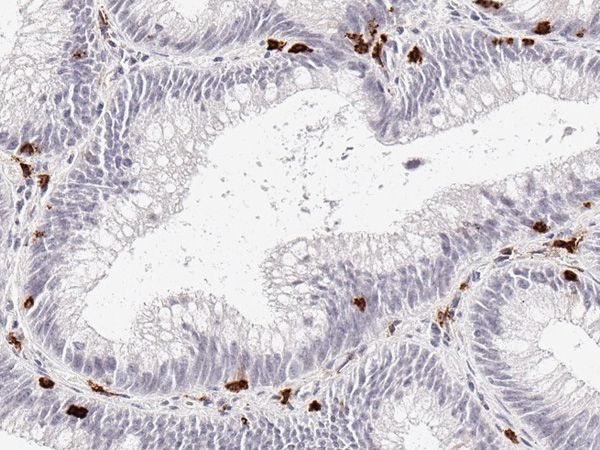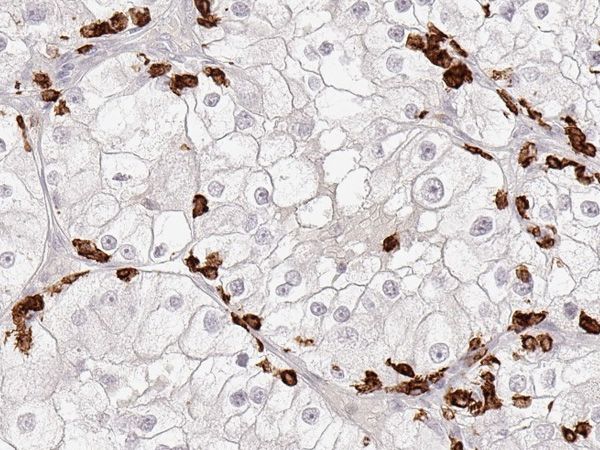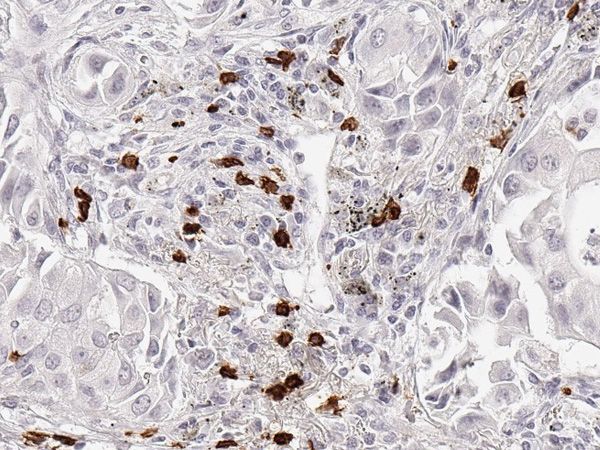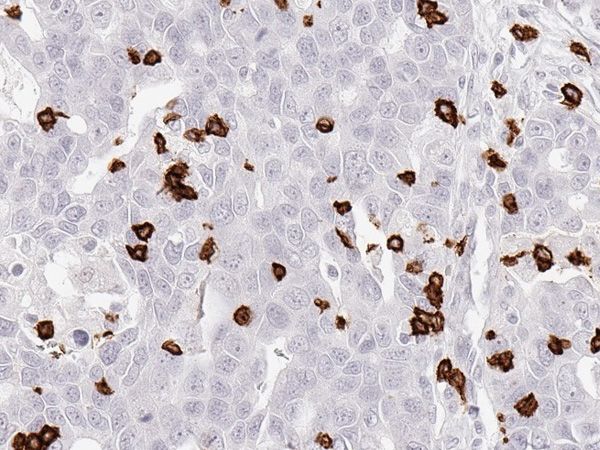Anti-CD8 (Hu) from Mouse (TC8) – unconj.




-
Overview
SKU DIA-TC8 Specificity Species Reactivity Immunogen Host Species Isotype Clone Clonality (Mono-/Polyclonal) Application Immunohistochemistry (IHC), Immunohistochemistry (Paraffin-embedded Sections), Western Blot
Conjugation Dilution Format 0.05% NaN3, 2% BSA, in PBS (pH 7.4), lyophilisate, purified antibody (from culture supernatant)
Product line / Topic Intended Use Temperature - Storage Temperature - Transport Search Code Manufacturer / Brand Uniprot_ID Gene_ID Alias CD8, CD8A, Cluster of Differentiation 8, Leu2, Leu2 T lymphocyte antigen, MAL, OKT8 T cell antigen, T cell antigen Leu2, T cell co receptor, T-cell surface glycoprotein CD8 alpha chain, T-lymphocyte differentiation antigen T8/Leu-2, T8 T cell antigen
- Datasheets and Downloads
-
Additional Product Information

dianova develops under the trademark “ONCOdianova” new antibodies for IHC detection of cancer immunology checkpoint biomarkers in FFPE-tissues.
Reactivity
Clone TC8 has been developed for the immunohistochemical (IHC) detection of CD8 in FFPE human tissue sections and validated for the identification of CD8 positive tumor infiltrating T cells (TILs). Anti-CD8 antibody (DIA-TC8) allows as yet unrivalled specific detection of CD8 in the tumor microenvironment.
CD8+ (cytotoxic) T cells can infiltrate different human tumors and are engaged in the development of a specific tumor microenvironment, which plays a central role in the killing of cancer cells. Cancer cells have developed the ability to generate immunosuppressive signals. Blockade of this interaction between cancer cells and immune cells is the key focus of modern immune checkpoint therapies. Preexisting CD8+ T cells seem to predict the efficacy of such immune checkpoint therapy.
T-cell receptors (TCR) recognize antigenic peptides presented on the surface of cancer and other target cells. These specific interaction trigger a TCR signaling transduction cascade, leading to execution of cytotoxic T lymphocyte (CTL) functions.
In contrast, inhibitory T-cell receptors such as PD-1, CTLA-4 and TIGIT are activated by the immunosuppressive tumor microenvironment with the aim to inactivate tumor-infiltrating lymphocytes (TILs). Effective blockade of such checkpoints by immunotherapy appears to be associated with the presence of CD8+ T cells.Immunohistochemistry of human CD8 in routine formalin-fixed paraffin-embedded (FFPE) tissue samples
A: Adenocarcinoma of the lung with marked infiltration by CD8 positive lymphocytes
B: Dense infiltrate of CD8 positive lymphocytes in a serous carcinoma of the ovary
C: Clear cell kidney cancer with high number of CD8 positive lymphocytes
D: CD8 positive lymphocytes in a low grade tubular adenoma of the colon
(A) Lung Adenocarcinoma

B) Ovary carcinoma

(C) Kidney cancer

(D) Colon adenoma
(pictures courtesy of Prof. Guido Sauter, Department of Pathology, University Hospital Eppendorf, Hamburg, Germany)
References
- Weynants P et al. Derivation of tumor-specific cytolytic T-cell clones from two lung cancer patients with long survival. Am J Respir Crit Care Med (1999) 159(1):55–62.
- Echchakir H et al. Evidence for in situ expansion of diverse antitumor-specific cytotoxic T lymphocyte clones in a human large cell carcinoma of the lung. Int Immunol (2000) 12(4):537–46.
- Karanikas V et al. High frequency of cytolytic T lymphocytes directed against a tumor-specific mutated antigen detectable with HLA tetramers in the blood of a lung carcinoma patient with long survival. Cancer Res (2001) 61(9):3718–24.
- Piccirillo CA et al. Cutting edge: control of CD8+ T cell activation by CD4+CD25+ immunoregulatory cells. J Immunol (2001) 167(3):1137–40.
- Bossi G et al. The secretory synapse: the secrets of a serial killer. Immunol Rev (2002) 189:152–60.
- Pages F et al. Effector memory T cells, early metastasis, and survival in colorectal cancer. N Engl J Med (2005) 353(25):2654–66
- Gajewski TF, Meng Y, Harlin H. Immune suppression in the tumor microenvironment. J Immunother (2006) 29(3):233–40.
- Kvistborg P et al. Anti-CTLA-4 therapy broadens the melanoma-reactive CD8+ T cell response. Sci Transl Med (2014) (254):254ra128.
- Tumeh PC et al. PD-1 blockade induces responses by inhibiting adaptive immune resistance. Nature (2014) 515(7528):568–71.
- Schumacher TN et al. Neoantigens in cancer immunotherapy. Science (2015) 348(6230):69–74.
-
Images

CD8_Colon_adenoma 
CD8_Kidney-cancer 
CD8_Lung-Adenocarcinoma 
CD8_Ovary-carcinoma
